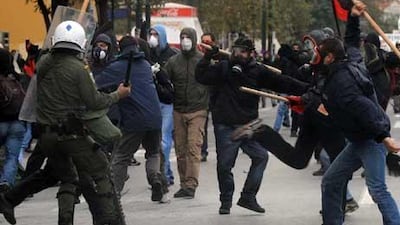BERLIN // Greece was hit by violent clashes and a general strike yesterday as workers across Europe demonstrated against austerity measures on the eve of a European Union summit to tackle the debt crisis engulfing the continent.
Rioting broke out in Athens during a demonstration by about 40,000 people when groups of hooded youths smashed cars and hurled petrol bombs and stones at police, who responded by firing teargas canisters and flash grenades to disperse them.
A central post office near the parliament building briefly caught fire and employees and bystanders ran for safety. It was a grim reminder of a riot in May when three people died in a bank that had been set on fire by demonstrators.
Protesters chanted "No sacrifice for the rich" and "Revolt". Greek air traffic was grounded and public transport, ministries, factories and schools shut down in protest at additional labour reforms and public pay cuts agreed by the parliament to meet the conditions of a €110 billion (Dh539b) bailout by the European Union and the Ínternational Monetary Fund in May.
"People have had enough. The anger is so great that nobody can stop it," said Ilias Iliopoulos, the general secretary of the civil servants' union ADEDY. "Today is a warning for what will follow after the holidays."
It was Greece's seventh general strike this year. The country got into trouble as a result of an economic slump in the wake of the 2008 financial crisis.
"Work rights are being suppressed and I think the whole Greek people should rise up," Ellada Christodoulou, a lawyer carrying a sign that said "default on payments now," told AFP news agency. "This is a fight not only in Greece but in the entire world."
The Socialist-led government has slashed pensions and salaries, hiked taxes and raised retirement ages to rein in a budget deficit that brought the nation to the brink of bankruptcy and triggered a crisis of confidence in the 11-year-old single currency.
Workers also demonstrated in France, Spain, Belgium, Luxembourg and the Czech Republic against cutbacks condemned as draconian.
In the Belgian capital where EU leaders will convene today for their two-day summit, some 300 people formed a human chain around the glass building of the European Commission, the EU's executive body, to protest against the belt-tightening launched by governments in Europe.
"These austerity plans are unfair. They hit the victims of the crisis and not those responsible for it, and they are economically stupid," said Claude Rolin, secretary general of the Belgian CSC trade union which helped organized the protest.
The German chancellor, Angela Merkel, under fire around Europe for her handling of the crisis, insisted that Berlin remained committed to the single currency, but again rejected a proposal to help out ailing countries through the introduction of euro bonds issued jointly by all member states.
Such a move would make it cheaper for countries to refinance themselves, but would drive up Germany's low government borrowing costs.
"We know that the euro is our collective destiny, and Europe is our collective future," Mrs Merkel said in a speech to parliament. "Nobody in Europe will be abandoned. Europe will succeed together."
Germany, Europe's largest economy, has borne the lion's share of the rescue packages for Greece and Ireland. Mrs Merkel, whose opinion poll ratings have slumped at home, is determined to avoid any measures that will increase the costs of the crisis for German taxpayers.
Mrs Merkel also rejected suggestions to increase the EU's €440 billion rescue fund for highly-indebted states. The summit is expected to replace the temporary fund with a permanent "European Stabilisation Mechanism" to come into force in mid-2013.
She has been blamed for exacerbating the crisis, first by hesitating too long before signing up to a bailout of Greece and then by saying publicly that private sector bondholders should share the cost of state bailouts. Both times, financial markets panicked and speculators drove up the borrowing costs of high-debt nations including Ireland, Portugal and Spain, driving them closer to insolvency.
In a sign of divisions among EU leaders, the foreign minister of Luxembourg, Jean Asselborn, accused Germany and France, the EU's two biggest economies, of trying to impose their wishes on the other members.
"Frau Merkel is a clever woman," said Mr Asselborn in an interview with Die Welt, a German newspaper. "I am sure that she will draw the right lessons from the past."

